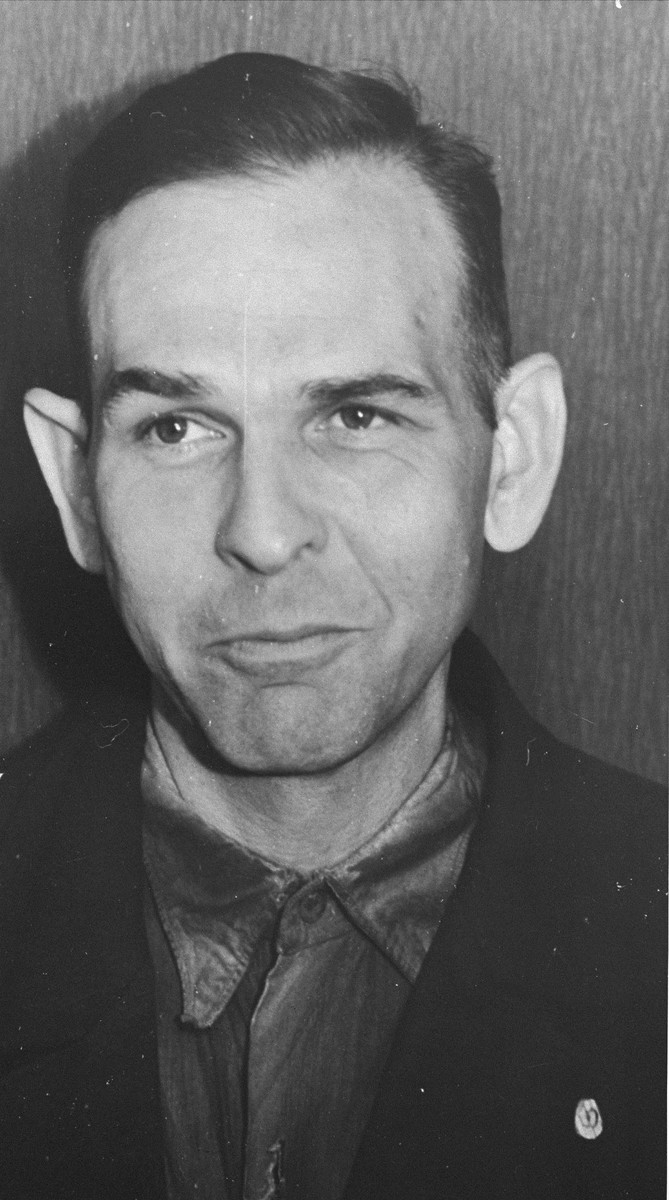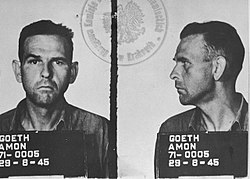Post by Bonobo on Mar 13, 2011 22:03:01 GMT 1
Amon Leopold Göth (11 December 1908 – 13 September 1946; pronounced [ˈɡøːt]) was an Austrian Nazi and the commandant of the Nazi concentration camp at Płaszów, General Government (a German-occupied area of Poland). A Hauptsturmführer (Captain) of the SS, he was tried as a war criminal after the war.
After the war, the Supreme National Tribunal of Poland at Kraków found Göth guilty of murdering tens of thousands of people. He was executed by hanging on September 13, 1946, age 37, not far from the former site of the Płaszów camp.
Early life and career
Göth was born in Vienna, then the capital of the Austro-Hungarian Empire, to a family in the book publishing industry. Göth joined a Nazi youth group at the age of seventeen, moved to a nationalist paramilitary group at the age of nineteen and at the age of twenty two, Göth became a member of the Austrian branch of the Nazi Party. In September 1930, he was assigned the Party Number 510764. Göth simultaneously joined the Austrian SS and was appointed an SS-Mann with the SS Number 43673.
Göth's early SS activities are little known, largely because the Austrian SS was an illegal and underground organization until the Anschluss of Austria by Nazi Germany in 1938. Between 1932 and 1936, Göth was a member of an Allgemeine-SS company in Vienna and, by 1937, had risen to the rank of SS-Oberscharführer (Staff Sergeant). Between 1938 and 1941, he was a member of 11th SS-Standarte operating from Vienna and was commissioned an SS-Untersturmführer (Second Lieutenant) on 14 July 1941.
Płaszów
In August 1942, Göth left Vienna to join the staff of SS-Brigadeführer Odilo Globočnik, the SS and Police Leader of Kraków.[1] He was appointed as a regular SS officer of the Concentration Camp service, and on 11 February 1943 was assigned to construct and command a forced labour camp at Płaszów. The camp took one month to construct using slave labour and, on 13 March 1943, the Jewish ghetto of Kraków was closed down with the surviving inhabitants imprisoned in the new labour camp. Approximately 2,000 people died during the evacuation. At his war crimes trial, Göth was accused of having personally shot many people during the action.[2]
On 3 September 1943, Göth was given the further task of closing down the ghetto at Tarnów, where an unknown number of people were killed on the spot. On 3 February 1944, Göth shut down the concentration camp at Szebnie by ordering the inmates to be murdered on the spot or deported to other camps, again killing several thousand people.
The balcony of Amon Göth's house in Płaszów - 2008
By April 1944, Göth had been promoted to the rank of SS-Hauptsturmführer (Captain), having received a double promotion and thus skipping the rank of SS-Obersturmführer (First Lieutenant). He was also appointed a reserve officer of the Waffen-SS. His assignment as Commandant of the Płaszów Labour Camp continued, now under the direct authority of the SS Economics and Administration Office.
It was Göth's firm belief that the Jews themselves should pay for their own execution, and it was wholly in this spirit when on 11 May 1942, in the small town of Szczebrzeszyn, the Gestapo ordered the Jewish council to pay 2,000 złoty and 3 kilos of coffee to cover the expenses for the ammunition used to kill the Jews.[3]
In Płaszów, Göth tortured and murdered prisoners on a daily basis. During his time at Płaszów, Göth allegedly shot over 500 Jews himself; Poldek Pfefferberg, one of the Schindler Jews, said, "When you saw Göth, you saw death." Göth spared the life of a Jewish prisoner Natalia Hubler, later famous as Natalia Karp, after hearing her play a nocturne by Chopin on the piano the day after she arrived at the Płaszów camp.
[edit] Dismissal and capture
On 13 September 1944, Göth was relieved of his position as Commandant of Płaszów and was assigned to the SS Office of Economics and Administration. Shortly thereafter, in November 1944, Göth was charged with theft of Jewish property (which, according to Nazi legislation, belonged to the Reich), and was arrested by the Gestapo. He was scheduled for an appearance before SS judge Georg Konrad Morgen, but due to the progress of World War II, and Germany's looming defeat, a tribunal was never assembled and the charges against him were summarily dismissed.
He was next assigned to Bad Tölz, Germany, where he was quickly diagnosed by SS doctors as suffering from mental illness and diabetes. He was committed to a sanatorium where he was arrested by American troops in May 1945. At the time of his arrest, Göth claimed to have been recently promoted to SS-Sturmbannführer and, during later interrogations, several documents listed him as "SS-Major Göth". Rudolf Höss was also of the opinion that Göth had been promoted and, when called to give testimony at Göth's trial, indicated that Göth was an SS-Major in the Concentration Camp service.
Göth's service record, however, does not support the claim of a late war promotion and he is listed in most texts as having only held the rank of SS-Hauptsturmführer equivalent of a Captain.[4]
Execution
After the war, the Supreme National Tribunal of Poland at Kraków found Göth guilty of murdering tens of thousands of people. He was hanged on September 13, 1946, aged 37, not far from the former site of the Płaszów camp. At his execution, Göth's hands were tied behind his back. The executioner twice miscalculated the length of rope necessary to hang Göth, and it was only on the third attempt that the execution was successful.[5]
en.wikipedia.org/wiki/Amon_G%C3%B6th


2 executions: first the fictional one portrayed in Schindler`s List, then the real one.
-------------------------------------------------------------------
Franz Kutschera (22 February 1904 in Oberwaltersdorf in Lower Austria – 1 February 1944 in Warsaw, Poland) was an SS General and Gauleiter of Carinthia. As SS and Police Leader of the Poland's Warsaw district, he was sentenced to death by Armia Krajowa ((AK) Polish Home Army) in agreement with the Polish government in exile and assassinated.
Life and career
Kutschera was a shipboy in 1918 in the Austro-Hungarian Navy. Afterwards, he became a gardener. In the 1920s, he lived in Czechoslovakia. He joined the NSDAP in late 1930 and the SS in late 1931.
From 1935 until March 1938 Kutschera was leader of the 90th SS Standard Carinthia, which became known after his death as Franz Kutschera. During Anschluss with Nazi Germany, he was for a short time (February to May 1938) managing Gauleiter of Carinthia, and thereafter first acting Gauleiter, and then finally Gauleiter in 1940-1941. After Anschluss he became a member of the Reichstag, remaining such until his death. Early in 1939 he became an honorary judge at the People's Court.
Announcement of death of 100 of Polish hostages shot by Nazi-German authority in Poland
Kutschera was appointed an SS-Brigadeführer in 1940 and late in 1942 a Major-General of the police. He distinguished himself in the fight against the Resistance with his fanaticism and skill. Hence, he was appointed SS and Police Leader, first from April 1943 in the Mogilev district of the Soviet Union and then as of September 1943, and until his death on 1 February 1944, the Police leader of the District of Warsaw in the occupied Poland.
[edit] Assassination by the Polish resistance
Main article: Operation Kutschera
Kutschera was sentenced to death by the secret Special Court of the Polish Underground State for the crimes against Polish nation, in particular mass murders of civilians in occupied Warsaw. The death sentence was approved by the Polish government in exile and the execution order was given by the commander of KeDyw, Gen. Emil August Fieldorf “Nil”. The assassination, code named Operation Kutschera a part of Operation Heads, was carried out in front of Kutschera’s Warsaw residency and near the Warsaw SS headquarters.[1] He was succeeded by Paul Otto Geibel.








